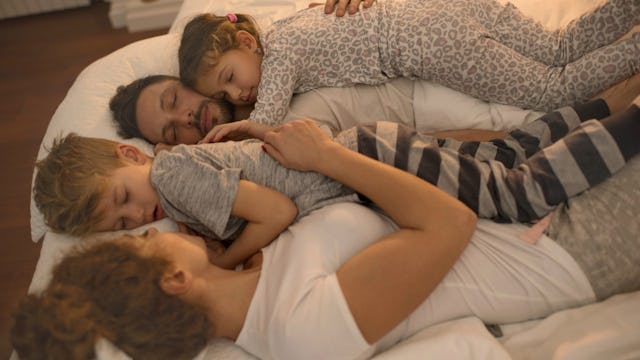Power Naps: Give Me 2 Hours Not 20 Minutes. But Science Says Differently

A few years ago, I wrote a list of what fathers really wanted for fathers’ day. Among my top four was a nap. I think I placed it above sex. I don’t know what it is about sleep and parenting, but it seems like it never happens. There is always someone arguing, or wanting a drink of water, or freaking out because their sock came off in the night.
If you are like me, the idea of a power nap sounds great and all, but good luck falling asleep in 10 to 20 minutes. I mean, honestly, give me two hours. It takes me at least 20 minutes just to fall asleep.
However, if you are one of those lucky people who can shut off and spring back to life at moment’s notice, there are actually several benefits to the power nap. But before we dive into all that, let’s talk about what exactly a power nap is. According to Sara Mednick, sleep scientist at the University of California, Riverside, a power nap is “a sleep session that happens during the day (ideally between 1:00 to 4:00 PM) that lasts between 10 and 30 minutes.”
Naturally, these are not hard and fast rules. Because if you’ve been awake with your toddler since God created the earth, a nap for 20 minutes around 11 or 12 will still count as a power nap.
So what are the benefits of a quick snooze on the sofa while your threenager is on your lap locked into YouTube kids? Well, according to a 2008 study in The Journal Of Sleep Research (how do I get a job there!?), ultra-short sleep episodes, can improve long-term memory that pertains to our ability to recall facts and knowledge. So the next time you are helping your 5th grader with social studies and you can’t, for the life of you, recall the year that Columbus landed in the American Continent, you can say, “Hold on son. I need a power nap.”
I know this all sounds laughable, but the reality is, like most parents, I’m looking for any reason to get a few zzz’s. And the fact that I’m not getting a nap is causing me to forget things might explain why I haven’t been able to find my wallet for the past three days. Outside of memory boosts, naps can also benefit your health. A recent article in Io9 put together a pretty awesome list of nap benefits. Turns out napping can lower blood pressure, reduce obesity (tell that to your personal trainer!), and increase over all energy and daytime productivity.
But outside of the benefits to adults, it turns out that power naps are really good for our children’s development too. Daytime naps after the age of two are really beneficial. Now I know, as I’m writing this I’m thinking about the last time my three-year-old took a nap during the day and I was up until after midnight with her running around the house like a wild honey badger on a pot of coffee. I’d rather slam my hand in a car door than do that again.
But science says that allowing young children to sleep during the day is more beneficial than my sanity, apparently. According to a 2013 study published in The Proceedings Of The National Academy of Sciences of the United States of America, classroom naps support learning in preschool children by enhancing memory. These researchers found that “sleep is critical in early learning.” Naturally, this study comes in contrast with many preschools that are getting rid of naps to make room for more curriculum.
If you are tired and just reading this post has you yawning, you are not alone. And if you have ever fallen asleep unexpectedly as a parent, I feel you. But don’t feel bad about it. Turns out you are doing something really good for your health and your brain. And if your child takes a little snooze during the day, be extra grateful, because it’s a good thing for their over all development. But don’t be afraid to wake them up after a short time (lest you want to be chasing after a three-year-old until midnight).
Last summer when I took my ten-year-old to his soccer game. I hadn’t slept much the night before because our youngest was sick. I went into our van during his warm up and fell asleep. I woke up and half the game was over. My son confronted me about this “Dad! Can’t believe you slept during my game.” I didn’t have much of an answer for my actions, so I juts apologized.
But if this happens again, I’m going to tell him that I was doing something good for my memory and my body. I’m sure he won’t understand, or even care, but maybe it will make me feel a little better at least.
This article was originally published on